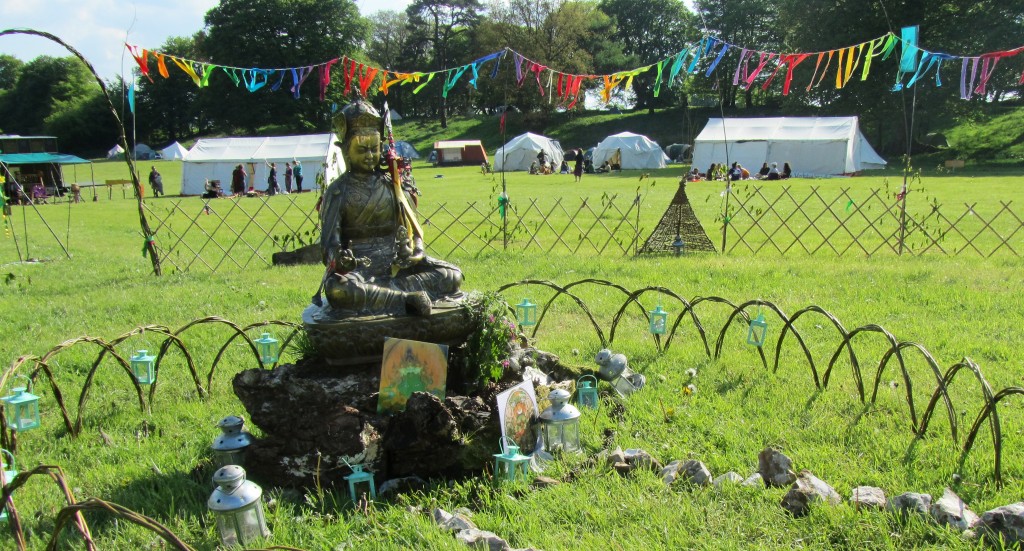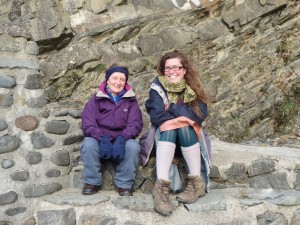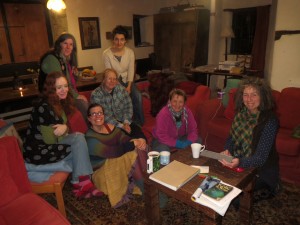
The highlight of last month was, for me, the Buddhafield Yatra. I thought it was totally great, it’s unlike everything else we do in Triratna and I would like to share an account of it with you – if anyone wanted to organize one themselves I’d be more than happy to advise.
In essence a Yatra is a walking retreat; over 7 days 30 of us walked 60 miles, from Reading train station (an easy place to get to for the start) to Avebury (a vast megalithic complex dominated by the great stone circle: a fine place to finish). It’s a walk, but with a distinctive etiquette: we walk in silence, in single file, each hour of walking beginning and ending in a circle, with any words from the leader (or others, who might, for instance, have a poem to share) followed by everyone bowing to one another. The leader then leads off in a spiral, walking around the outside of the circle with everyone following. Behind the leader is a map-reader; at the rear is a backstop who ensures no-one gets left behind. Two vehicles, a van and a run-around car, stay with the day’s team of about 4 people; they tat-down the previous night’s camp, do the shopping, go ahead with the luggage and set up the next night stop, cook dinner, and welcome the weary walkers as they arrive. The car is available to pick up anyone who can’t walk the full distance. The roles all swap around, everyone plays their part. Morning and evening there’s time for meditation, Dharma talks, reporting-in and Puja or other rituals; the silent walking is of course mindful and an excellent way to practice Bhante’s ‘Four Levels of Awareness’.
All that alone would be great, but Yatras are much more too. Five aspects especially struck me this time – the landscape, the elements, the rituals, the community, and the journey back in time. The walk took us along the River Thames and up onto the Ridgeway, a 5000-year-old trackway across the high dry ground of the Wiltshire downs. Water gave way to Earth, Fire warmed us at night, Air buffeted us as Consciousness walked though Space. For me this was a delight, a week away from computers simply immersed in the present moment and our surroundings: big skies and big landscapes led effortlessly to ‘big mind’. It wasn’t all easy: we were fully exposed to the elements, even by Buddhafield’s minimal standards. At night, the only shelters were our tents and an awning hung off the side of the van. While walking, the only refuge was to be mindful of (and hang loose to) our experience rather than resist it. And we had weather in abundance – hot sun, strong wind, driving rain, blue skies, cold nights. Happily none lasted too long – we could see for ourselves that all things passed, the Three Laksanas held true…
Almost every night we camped at one or another ancient monument or hillfort, giving a wonderful backdrop to a series of improvised rituals. The first evening we started with the Dedication Ceremony, but thereafter took off into realms of creativity. Morning by the river, with rain threatening, saw a ‘baptism’ by Air and Water, based on a Biodanza exercise; that evening another by Fire and Earth – specifically, building and jumping a fire in the woods. The next morning, finding ourselves next to Scutchamer Knob, an ancient collapsed burial mound, we surrounded it and one by one approached the shrine in the centre of the amphitheatre-like space holding a Vajra, shouting our names to the wind, declaring our intentions for the day’s walk – to “walk with confidence, sensitivity, etc”. And off we went… At Uffingdon, on Dragon’s Hill at sunset, in the howling wind, we recited the Ratana Sutta and met, tamed, and befriended our Demons, this time calling their names into the wind. At Waylands Smithy, an ancient tomb in a beautiful beech-tree grove, we began what came to be several ceremonies connecting us with our Ancestors – those unknown people who first walked the Ridgeway and built (with stupendous labour) the many special places we were passing.
We used verses and pujas by Dhiramati, to whom I’m profoundly grateful; he has such a gift with words and poetry. We began with his verses ‘To the Ancestors’; that night, by a fire in a field under the starry sky, his beautiful puja to Tara and the Elements. In the wide open space of Barbury Castle Akasaka led us in the Amoghasiddhi mantra and offering our intentions (symbolized by flower petals) to the wind. By this time Reading train station seemed a million miles and several thousand years away!
Approaching Avebury, our destination, for two nights our only campsite and kitchen was the public car park and grass verge by the track: happily we were undisturbed. We’d tried and failed to find a more orthodox campsite for this part of the walk; it was clear how we as Yatrikas had in a sense gone forth from the regular world and (rather like the Buddha and his followers) been forced to take our chances night by night.
Soon after our arrival we embarked upon an all-night vigil inside West Kennett Long Barrow; some 25 of us crowding in with almost 20 staying till dawn. Akasaka and I had drafted a seven-round ritual, recapping and building on the many ceremonies already performed. Each round had several stages, for instance the first, ‘Connecting with the Ancestors’ consisting of a welcome talk by Sean (a Druid as well as a Buddhist); entering the Barrow; creating a shrine and finding our places; Dhiramati’s ‘Verses to the Ancestors’ and ‘Spirit Song’; the Ratana Sutta and an offering of one sunflower seed each inside the chamber; and finally the Aksobhya mantra and earth-touching mudra. The other rounds were ‘Setting our intentions for the night’; ‘Evoking our potential’ (verses and mantras to Amoghasiddhi and Tara, ending with extinguishing all lights and holding hands in the total darkness); ‘Confession and Acknowledgement of Regrets and Limitations’; ‘Aspirations and Next Steps’; ‘Rebirth and Re-emergence’ (in the first light of dawn); a ‘Retreat Metta and Transference of Merits’ and finally the recitation of Kalidasa’s wonderful ‘Exhortation to the Dawn’ at sunrise at 5.06am. Followed by the long walk back to our camp and sleep! The next day saw us end the Yatra by walking the mile-long Avenue into Avebury and reporting-out among the stones – and meeting Terry Dobney, Arch-Druid of Avebury and Keeper of the Stones, for a formal welcome into and most fascinating tour of the site.
Probably not surprisingly, we were a pretty strong community by this time, even though we’d all spent many hours in silence, simply walking together. Certainly we’d all lived though an adventure together, ably facilitated by the excellent Buddhafield team. For me, it was a great combination of a simple and elemental life, a whacky adventure, and a serious contribution to our great shared enterprise of bringing Buddhism to the West, even, to re-imagining the Buddha. I’m over my word count so can’t say more; but there’s photos of Yatra 2011 — Reading to Avebury on Flickr.
__
Lokabandhu



